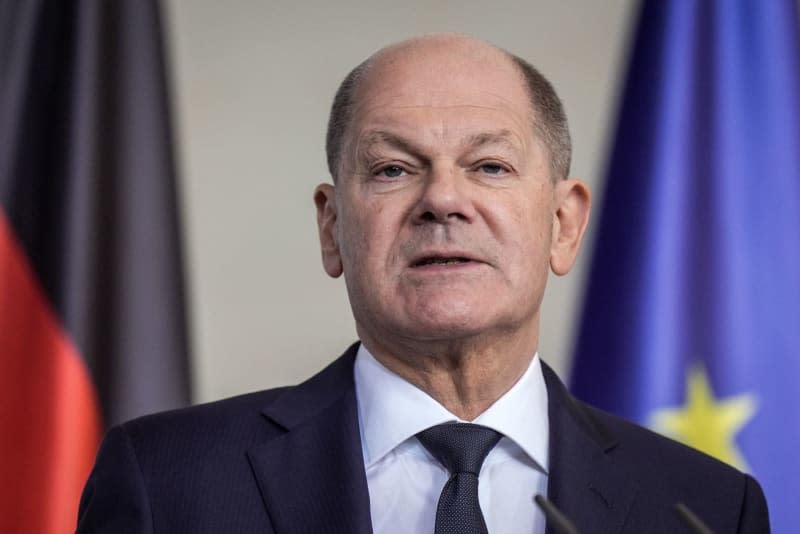Europe 'must do even more' on defence, says Scholz on war anniversary

- Oops!Something went wrong.Please try again later.
German Chancellor Olaf Scholz has called for Germany and Europe to make a bigger effort when it comes to defence, in a statement to mark two years since the full-scale Russian invasion of Ukraine.
"Russia is not only attacking Ukraine, it is also destroying peace in Europe," Scholz said.
Ukraine would be supported in its self-defence "for as long as necessary," he said.
"And we, Germany and Europe, are doing more - and must do even more - so that we can defend ourselves effectively."
NATO, he argued, was the best guarantee of defence "on both sides of the Atlantic."
Scholz pointed to increased investment in the German army as a sign that it was fulfilling its commitments to NATO.
This year, Germany is investing 2% of its total economic output into the military for the first time in decades, Scholz said, alluding to a long-held NATO target.
"And this will remain the case in the coming years and decades," he promised.
"Constant" production of ammunition - currently a topic of much debate in Europe - was a key element of defence, he said, and European countries should pool their orders.
Conservative leader Friedrich Merz - one of the most likely candidates to challenge Scholz for the chancellorship at the next elections - has called on the German government to provide Ukraine with all the weapons it needs to fight back against Russia.
In an interview with dpa, the leader of the opposition Christian Democrats said that German promises to help Ukraine for as long as necessary, were not enough.
"This is the wording I would like to hear: We are helping Ukraine with all the means at our disposal so that we really do see an end to this terrible war soon."
According to one of Germany's leading military academics, Carlo Masala, the fighting in Ukraine will not come to end this year.
"I don't see an end to this war in 2024, there is nothing that could give us hope," the political scientist told the Augsburger Allgemeine newspaper on Saturday.
"Ukraine will not find peace because Russia still believes it can win this war," said the professor at the University of the Federal Armed Forces in Munich.
Time is increasingly playing into the hands of Russian President Vladimir Putin, he said.
Meanwhile the Ukrainian ambassador, Oleksii Makeiev, sharply criticized the left-wing politician Sahra Wagenknecht and the far-right AfD party for their rejection of arms deliveries to his country.
In an article in the Neue Osnabrücker Zeitung newspaper on Saturday Makeiev said that it was "criminal to adopt Russian propaganda or to claim that you don't need weapons to defend yourself. This loser philosophy is absolutely irresponsible in view of the current situation."
Wagenknecht, founder of the new BSW party has repeatedly attacked the German government for spending on armaments and aid for Ukraine. The AfD has described arms deliveries as "unnecessary expenditure."
Makeiev rejected calls from German politicians for negotiations with Russia, and pointed out the long-term consequences of the war for the whole of Europe. "The scale of this catastrophe will affect the lives of the next generations of Ukrainians and Europeans."
The anniversary was also marked by other groups in Germany on Saturday. Greenpeace activists projected the demand "Stop the killing" onto the Russian embassy in Berlin.
"Russia must stop the killing in Ukraine and withdraw," said Alexander Lurz, disarmament expert at Greenpeace. The activists are also calling for the international community and the German government to step up their diplomatic efforts to end the war.

